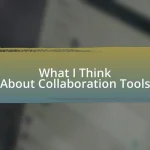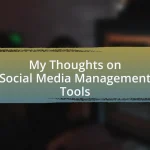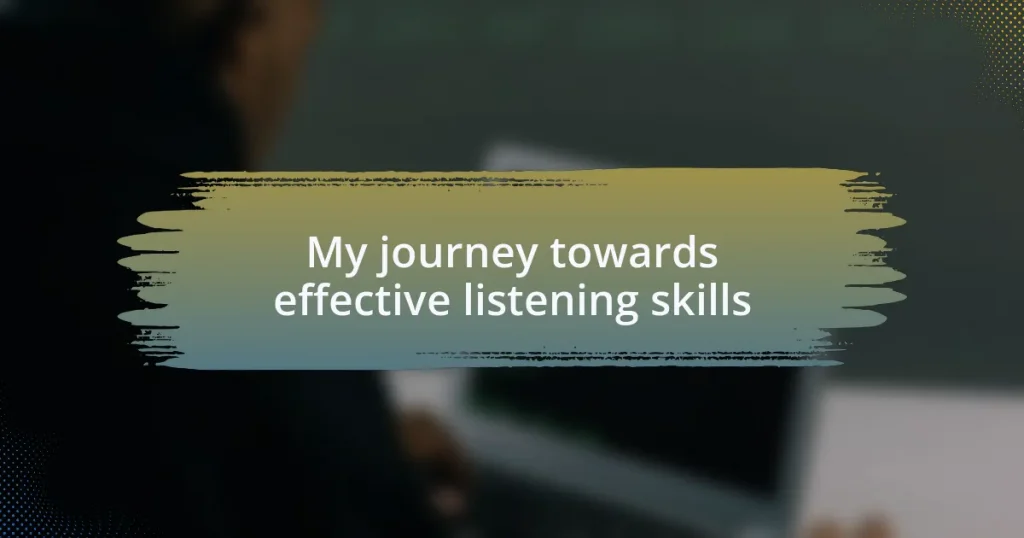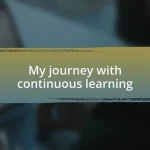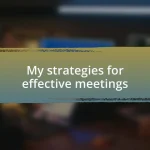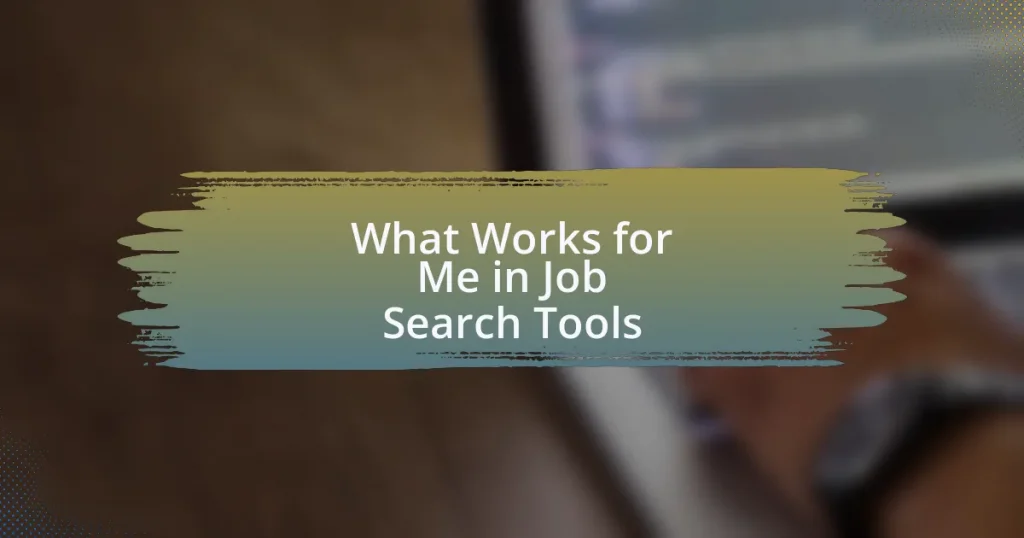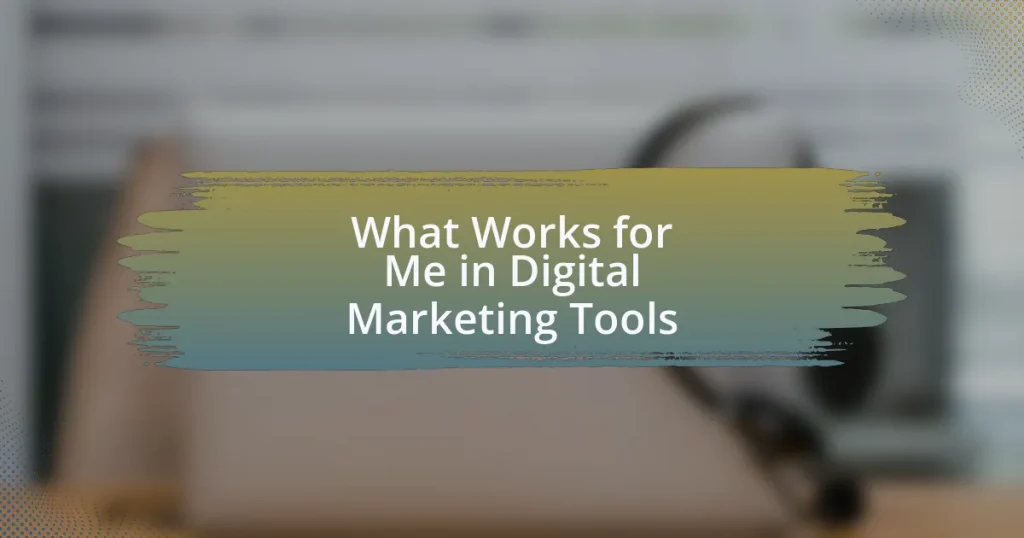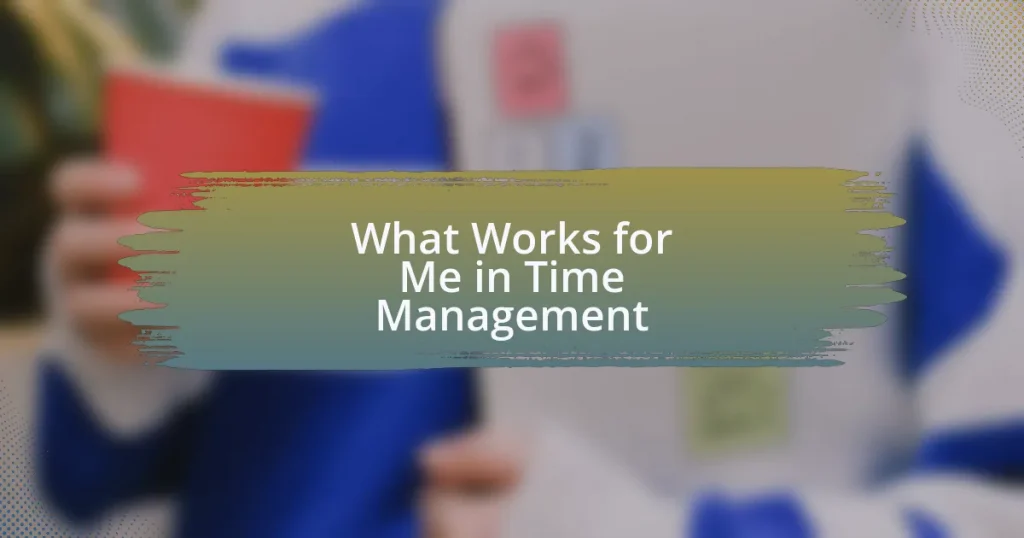Key takeaways:
- Effective listening involves active engagement, empathy, and creating a distraction-free environment to enhance understanding and communication.
- Poor listening can lead to misunderstandings and hinder collaboration, emphasizing the need for clarifying questions and summarizing to confirm comprehension.
- Barriers to effective listening include distractions, preconceptions, and emotional states, which can impede the ability to absorb and connect during conversations.
- Continued growth in listening skills requires reflection, minimizing distractions, and using verbal affirmations to encourage meaningful dialogue.
Author: Charlotte Everly
Bio: Charlotte Everly is an accomplished author known for her evocative storytelling and richly drawn characters. With a background in literature and creative writing, she weaves tales that explore the complexities of human relationships and the beauty of everyday life. Charlotte’s debut novel was met with critical acclaim, earning her a dedicated readership and multiple awards. When she isn’t penning her next bestseller, she enjoys hiking in the mountains and sipping coffee at her local café. She resides in Seattle with her two rescue dogs, Bella and Max.
Understanding effective listening skills
Effective listening skills go beyond simply hearing what someone says; they require active engagement and genuine interest in the speaker. I remember a time in a team meeting when I felt overwhelmed by my own thoughts, barely catching the ideas being shared. That day taught me that true listening means setting aside distractions and focusing fully on the speaker, which enhances understanding and fosters better communication.
When I think about my listening experiences, I often reflect on how empathy plays a crucial role. Have you ever felt like someone truly understood your perspective during a conversation? I have, and it changed the way I interact with others. By tuning into the speaker’s emotions and body language, I learned to respond more thoughtfully, which deepened my connections and enabled more meaningful exchanges.
One key aspect of effective listening is asking clarifying questions. I’ve found that when I seek to understand rather than simply respond, it creates a dynamic dialogue. Have you tried rephrasing what someone has said to ensure clarity? This approach not only confirms comprehension but also shows the speaker that their message matters, elevating the overall conversation.
Importance of listening in communication
Listening is a vital component of effective communication, yet it often goes unrecognized. I remember attending a workshop where we practiced active listening techniques. It was eye-opening to realize how attentively listening to others not only enhances our comprehension but also makes the speaker feel valued. When we genuinely listen, it creates an environment of trust and respect, which is foundational for productive conversations.
Another aspect that strikes me is how poor listening can lead to misunderstandings. I once misinterpreted a colleague’s suggestion because I was too focused on formulating my response. This miscommunication not only caused friction but also hindered our project’s progress. It was a stark reminder that effective listening is about more than just receiving information; it’s about fostering clarity and collaboration among team members.
Moreover, effective listening fosters a culture of feedback. Think about the last time someone took the time to listen to your ideas. Wasn’t it refreshing? In my experience, when I actively listen, it opens doors for constructive criticism and new perspectives. This practice not only builds relationships but also enhances personal growth, as we learn from those around us.
Common barriers to effective listening
Distractions are a significant barrier to effective listening, and I’ve encountered this firsthand. During a team meeting last month, I found myself checking my phone while others spoke. I missed critical points and later realized that my lack of focus not only hindered my understanding but also made my teammates feel ignored. How often do we let distractions creep in, prioritizing our devices over meaningful conversations?
Another common obstacle is preconceptions. I find that when I enter a discussion with a fixed mindset, I tend to filter out what the other person is saying. For instance, I once assumed a teammate’s idea wouldn’t be relevant based on past experiences. This closed-off attitude not only stifled potential innovations but also made my colleague reluctant to share in future discussions. Have you ever noticed how your biases can cloud your judgment in conversations?
Emotional states also play a crucial role in our listening abilities. There have been times when I was stressed or upset, and I found it incredibly challenging to absorb what others were saying. I remember a project meeting where I was on edge due to tight deadlines. Instead of listening intently, I was preoccupied with my own worries. I’m curious—how do you manage your emotions during conversations? It’s essential to create a mental space for active listening, or we risk missing out on valuable insights.
Techniques to improve listening skills
One effective technique I’ve found for improving my listening skills is practicing active listening. This means fully concentrating on what the other person is saying rather than just passively hearing them. I remember attending a workshop where we were paired up to share stories. By focusing intently on my partner’s words and asking clarifying questions, I felt more connected and engaged in the conversation. Have you ever experienced the shift that comes from being genuinely present?
Another strategy I use is summarizing what I’ve heard to ensure clarity. After a colleague explains a new project feature, I often paraphrase their points back to them. This not only confirms my understanding but also shows them that I value their input. I once did this during a brainstorming session, and my colleague expressed appreciation for acknowledging their hard work. How often do we miss opportunities to affirm others through our listening?
Creating a distraction-free environment is also critical. I’ve learned to take notes on paper instead of my laptop during meetings, which helps me stay focused. This simple change has notably enhanced my retention of information and allowed me to engage meaningfully. Think about your own settings; are there adjustments you can make to reduce distractions and foster better communication?
My personal listening journey
My listening journey has been a gradual evolution, shaped by both professional experiences and personal interactions. I vividly remember a time when I struggled in a team meeting, overwhelmed by multiple voices sharing ideas. It hit me just how crucial it is to tune into one person at a time. Since then, I’ve made it a point to focus on the speaker, even if that means letting others fade into the background momentarily. Have you ever had a moment where you realized you were lost in the noise?
A turning point for me occurred during a crucial client presentation. As I listened intently to their needs, I could practically feel the weight of their expectations. I felt the difference in how I responded afterward: not just with solutions, but with empathy. It reinforced my belief that effective listening goes beyond just hearing words; it’s about connecting with the emotions behind them. Have you ever felt that a simple conversation carried deeper significance than just words exchanged?
Reflecting on those experiences, I acknowledge that listening is a skill I continue to refine. Sometimes, during casual conversations, I catch myself drifting off, caught up in my thoughts. It’s a reminder that improving my listening skills is an ongoing journey that requires mindfulness and consistency. What strategies have you found to keep your attention from wandering?
Challenges I faced in listening
During my journey, one significant challenge I faced was the habit of preemptively thinking about my response while someone else was speaking. I often found my mind racing ahead to what I wanted to say rather than truly absorbing their words. Have you ever felt that nagging urge to jump in, even when you knew you should listen? It took conscious effort to silence that internal chatter and fully engage with the speaker.
Another hurdle was encountering situations where distractions were inevitable, especially in open office environments. I remember sitting in a brainstorming session, where the noise around me made it hard to concentrate on my colleague’s ideas. The struggle to filter out background sounds and remain focused left me feeling frustrated. Have you been in a similar situation where external noise hindered your ability to listen? It pushed me to explore techniques like mindfulness to help ground myself amidst the chaos.
Finally, I grappled with my tendency to interrupt out of enthusiasm when an idea sparked a thought. This eagerness sometimes led me to overlook the speaker’s full message. I realized that my excitement should enhance the conversation, not derail it. How do you balance contributing to a discussion without cutting others off? This challenge has taught me the value of patience—waiting for the right moment to share my insights while honoring the speaker’s complete message.
Tips for continued listening growth
Improving listening skills is an ongoing journey that requires deliberate practice. I often set aside time to reflect on conversations I’ve had, considering what went well and what could be better. Have you ever taken a moment after a discussion to think about your listening habits? This reflection helps me identify areas where I can improve, keeping my growth in check.
One of the best practices I adopted was to minimize distractions during conversations. For instance, when a colleague comes to share their ideas, I close my laptop and put my phone out of sight. This simple act reinforces my commitment to being present. It’s amazing how much more I grasp when I fully dedicate myself to the person speaking. How often do you find yourself multi-tasking during important discussions?
Additionally, I’ve started using verbal affirmations to encourage speakers. Phrases like “I see what you mean” or “That’s interesting” not only show that I’m engaged but also help clarify my understanding of their points. When was the last time a little encouragement made a big difference in a conversation for you? I’ve found that these small confirmations foster a more open dialogue, making it easier for both parties to connect.





